60% of Workers See Job Market Competition and Limited Resources as Biggest Challenges for 2025 Career Resolutions
As the new year approaches, workers across the United States are gearing up to set career resolutions for 2025. From skills development to work-life balance, here’s a closer look at the ambitions and obstacles shaping the career landscape in 2025.
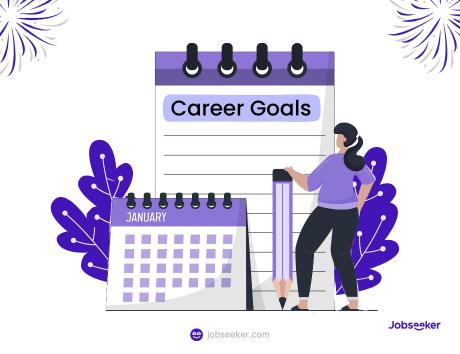
The start of a new year gives people the chance to turn over a new leaf in their careers and set goals for what they want to achieve over the coming 12 months. According to Jobseeker’s latest survey, workers are setting ambitious career goals for 2025, but many face challenges. Here are the key findings:
- More than four out of five US workers plan to set career resolutions for 2025.
- Less than one in 10 manage to complete them.
- The most common obstacles include job market competition and limited resources.
- AI adoption is expected to help workers overcome career challenges.
- Skills development and work-life balance are top priorities for 2025.
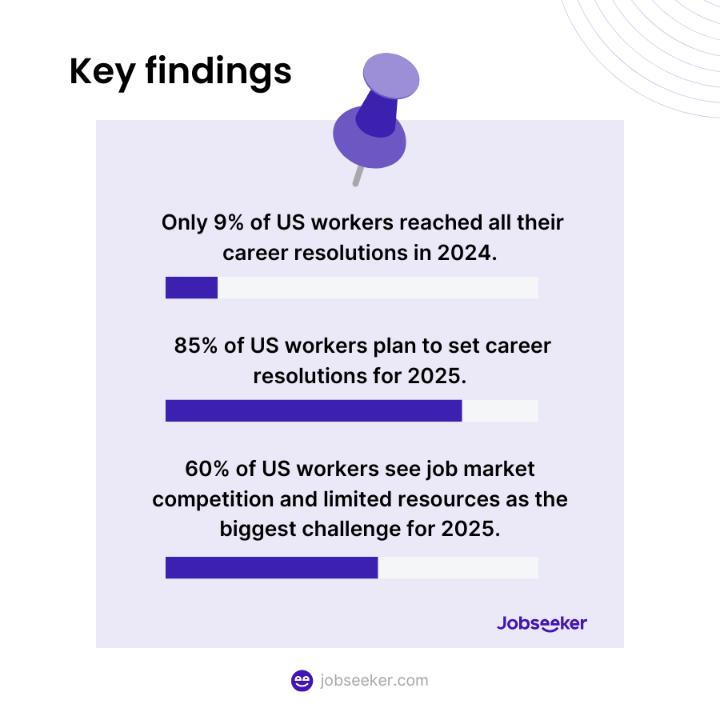
Let’s take a look at the resolutions US employees are pledging for 2025, and the obstacles that stand in the way of achieving their goals for the coming year.
Survey Background
Jobseeker carried out an online survey of 1,200 American workers to explore their top career resolutions and understand the challenges employees anticipate for 2025. The results paint a picture of workers’ priorities, including skills development, work-life balance and career progression. The evolving role of artificial intelligence (AI) offers the potential to help workers overcome obstacles and achieve their goals. While most employees set career goals at the start of the year, many struggle to complete their objectives, with job market competition, work-life balance, and limited resources standing as the greatest obstacles to success.
New Year's Career Resolutions Popular Among US Workers
Making resolutions for the year ahead has long been a popular tradition, and US workers continued the trend in 2024. In total, 85% of employees surveyed said they had set themselves a career resolution for 2024, putting career development and progression firmly on the agenda for the year ahead.
- Younger workers were more likely than older employees to set career resolutions, with 91% of respondents aged 18 to 27 (Gen Z) setting goals, compared to just 65% of those aged 60+ (Boomers).
- The trend of setting career goals remains strong as we approach 2025, with the same proportion of workers (85%) certain that they’re going to set goals for the year to come. A further 7% of employees remain undecided whether they’ll set any new career goals for the year ahead.
Majority of Workers Struggle to Complete Career Resolutions
While New Year’s career resolutions are popular among US workers, many workers fall short of achieving their objectives in full. For 2024, only 9% of survey respondents had completed all their career resolutions for the year.
- Four in 10 workers (41%) had only managed to achieve half of their objectives or fewer, although in positive news, half did manage to complete most of what they set out to achieve (50%).
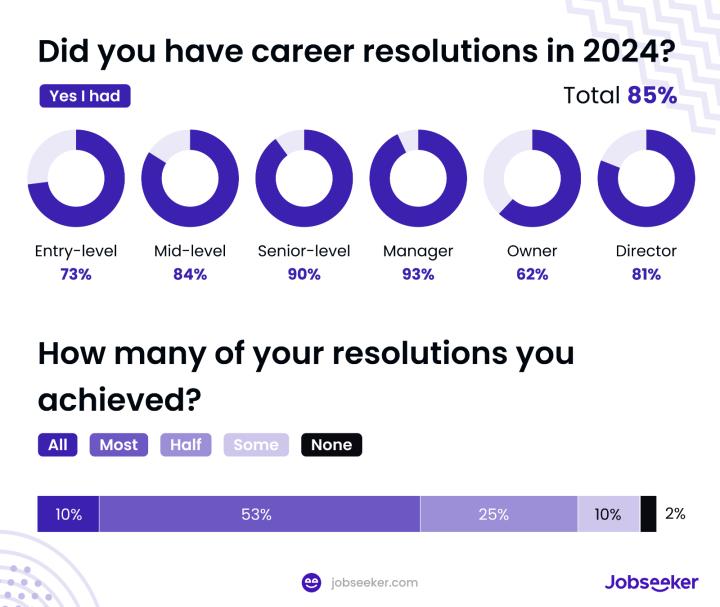 The ability to achieve most or all of your career goals appears to be linked to your career stage. Junior and mid-level employees struggled more than senior workers to achieve their objectives for 2024:
The ability to achieve most or all of your career goals appears to be linked to your career stage. Junior and mid-level employees struggled more than senior workers to achieve their objectives for 2024:
- 58% of those in entry-level or mid-level roles reported achieving most or all of their goals during the year. This increased to 68% for senior-level employees, 66% for managers or team leads and 71% for directors or C-level executives
expert tip!
Skills and Work-Life Balance Take Priority for 2025
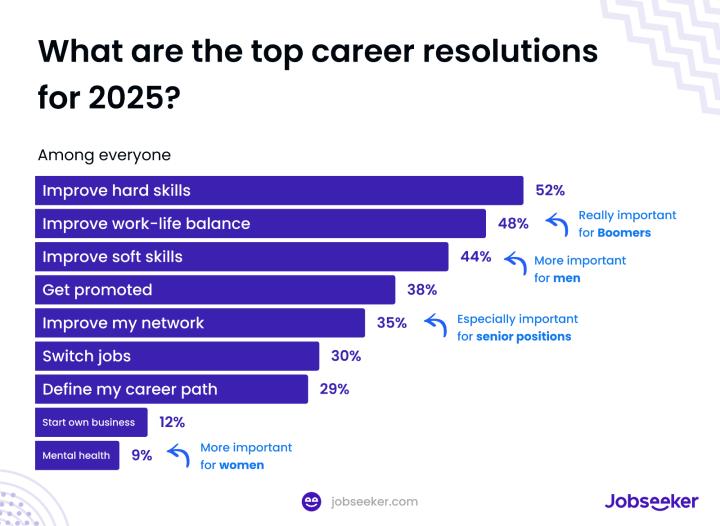 The most popular priorities for career development in 2025 are skills development and work-life balance. Both hard and soft skills development are high on the agenda for US employees, indicating that workers feel the need to continue adding skills to remain relevant and competitive in the job market. Meanwhile, improving work-life balance is a priority for most groups, but particularly among older workers:
The most popular priorities for career development in 2025 are skills development and work-life balance. Both hard and soft skills development are high on the agenda for US employees, indicating that workers feel the need to continue adding skills to remain relevant and competitive in the job market. Meanwhile, improving work-life balance is a priority for most groups, but particularly among older workers:
- Developing hard skills is the top priority for US employees, with 53% of survey respondents mentioning this as one of their top three career resolutions for 2025.
- Almost as many respondents (44%) wish to improve their soft skills in the coming year.
- Nearly half of US workers (48%) want to focus on improving their work-life balance in 2025.
- Boomers (60+) are more focused on work-life balance than any other group (71%), while they’re also more likely to prioritize their mental health (45%, vs 8% overall).
- Younger workers are more likely to prioritize promotion and defining a clear career path in the coming year than those from older generations, perhaps reflecting the career stage they find themselves at.
- When it comes to seniority, entry-level employees are far more likely to mention ‘switching jobs’ (40%, compared to 29% overall).
- Owner/founders and director/C-level employees are more likely to want to focus on building their network (43% and 57%, compared to 35% overall).
With roughly half of US employees who change jobs also experiencing a change of industry (1), it’s easy to see why skills development is at the forefront of worker priorities. Focusing on new skills can help to equip employees who decide to take the plunge with a new career in 2025.
Main Challenges that Keep Employees from Achieving their Resolutions
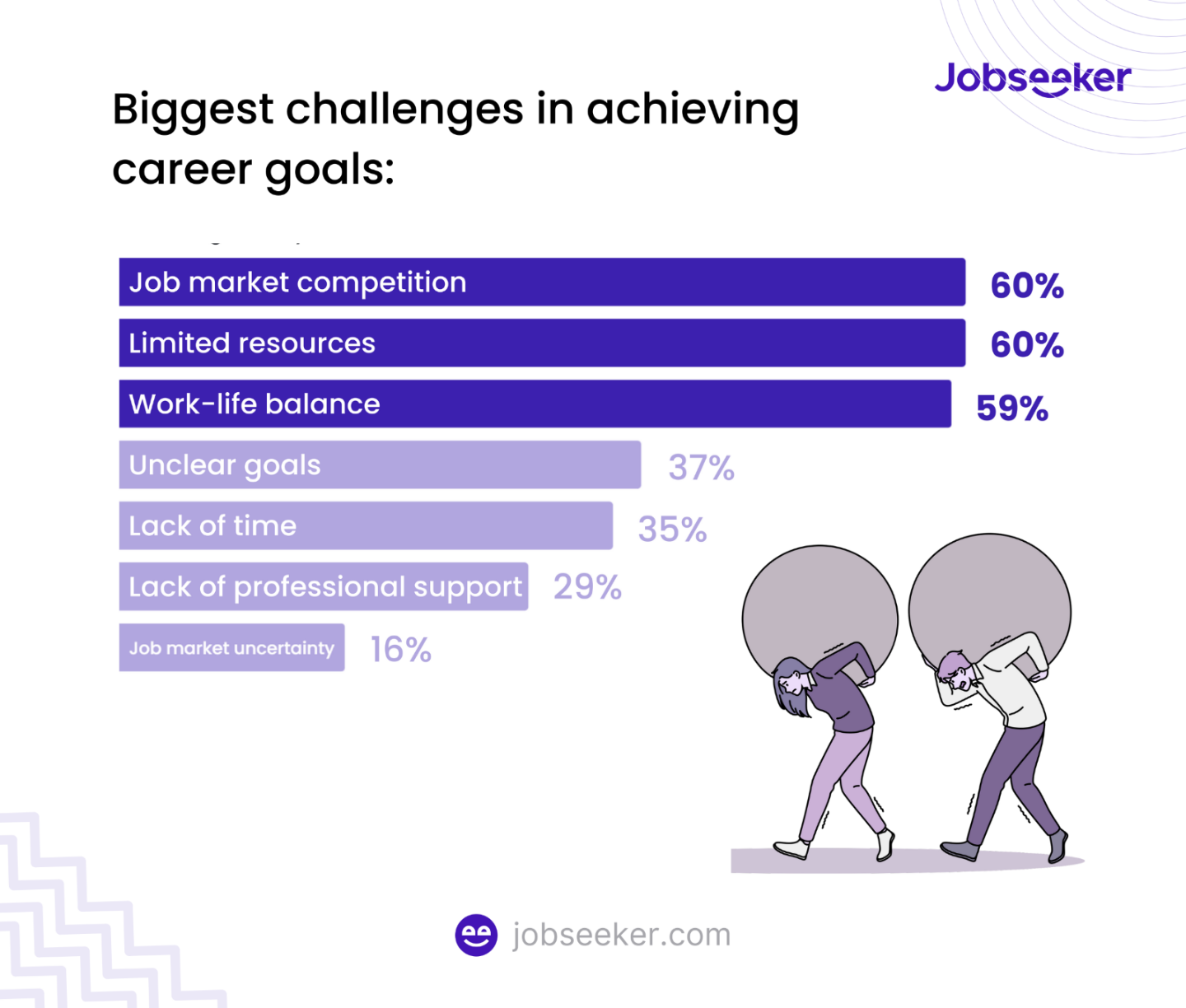
While career resolutions are popular among US workers, there are plenty of obstacles to completing them. For the next 5 years, the expected obstacles stem from competition, resources and work-life balance:
- Job market competition and limited resources (both 60%) were the most frequently mentioned challenges to achieving career resolutions.
- Work-life balance was also a concern, with more than half of US workers (54%) anticipating that this could get in the way of achieving their objectives.
- Job market competition poses a significant challenge for senior-level employees (66%) and managers (69%). Entry-level employees (67%) and business owners (71%) cite limited resources as their biggest obstacle, while directors (76%) struggle most with maintaining work-life balance.
There are also generational differences when it comes to the perceived obstacles to achieving career resolutions:
- Gen Z, Millennial and Gen X workers are far more likely to mention job market competition and limited resources than Boomers, with just 40% and 38% of those aged 60+ mentioning these issues.
- Lack of time was perceived as the biggest threat to Boomers not completing their career plans (50%).
- Unclear goals potentially prevent career advancement for 34% of Gen Z workers and 38% of Millennials, while Gen X and Boomers are more confident about the clarity of their plans, with just 27% and 17% mentioning unclear goals respectively
Expert tip!
AI to Help Workers Achieve More Career Goals?
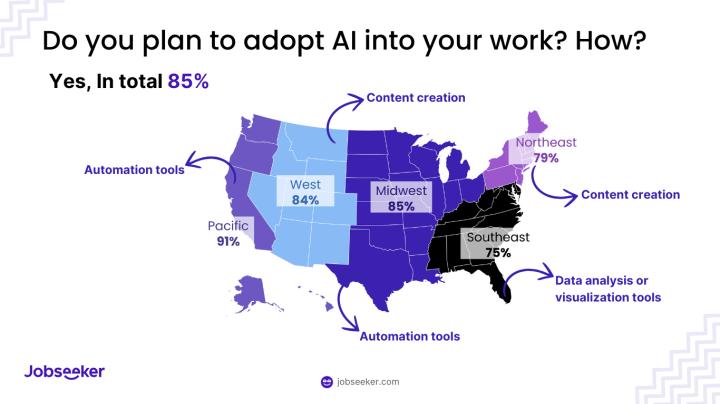
With limited resources viewed as a genuine obstacle to achieving career resolutions in 2025, perhaps Artificial Intelligence (AI) can offer solutions for US workers. Indeed, 85% of respondents said they planned to use AI in their work in the coming year, while studies show AI-related skills are among the fastest-growing job skills in the US (2). All this indicates AI’s growing influence, with it increasingly considered a solution to the challenges facing the workforce. Here are some of the key trends in AI adoption for the coming year:
- Younger workers are far more likely to be comfortable using AI in their work than older workers, with 88% of Gen Z and Millennial workers planning to use it, compared with 74% and 52% of Gen X and Boomers respectively.
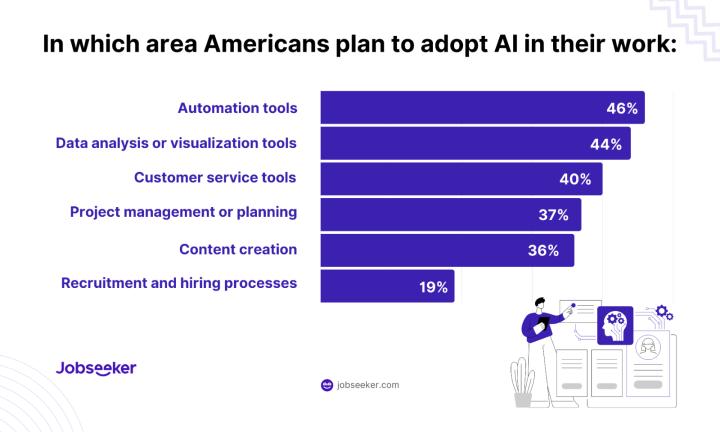
- Automation tools (49%) and data analysis or visualization tools (46%) were the most common uses of AI among workers.
- More than nine out 10 US workers would like to use AI to help them achieve their career goals in 2025.
- By far the most common expected use of AI in helping workers with their career development in 2025 was to help improve skills (57% of those who plan to use AI for their career development).
- Boomers are less likely to use AI. However, those who plan to are more likely to use AI for ‘improving skills’ than other groups (59%).
- ‘Planning my career path’ was the next most common anticipated use of AI for career development, with 26%, while ‘creating my resume’ and ‘interview preparation’ were mentioned by 13% and 3% respectively.
Productivity Hacks to Turbocharge Career Progression
Alongside the use of AI, workers have a few more tricks up their sleeves to overcome the challenges work throws at them. The trusty to-do list is as popular as ever, with more than three in 10 workers (31%) identifying the simple habit as the key to their productivity. Other trends include:
- Morning coffee or tea is the key to a productive day for more than a quarter of US employees (28%), with a hit of caffeine more critical for older workers than those in the younger generations (34% and 35% for Gen X and Boomers, compared to 24% and 26% for Gen Z and Millennials).
- Younger workers are more likely to favor time blocking to get through their workload than older workers. 22% of Gen Z and Millennials mention time blocking compared to 18% of Gen X and just 8% of Boomers.
- Meanwhile, 20% of Gen Z and 15% of Millennials mention deep focus sessions, compared to 14% and 15% of Gen X and Boomers.
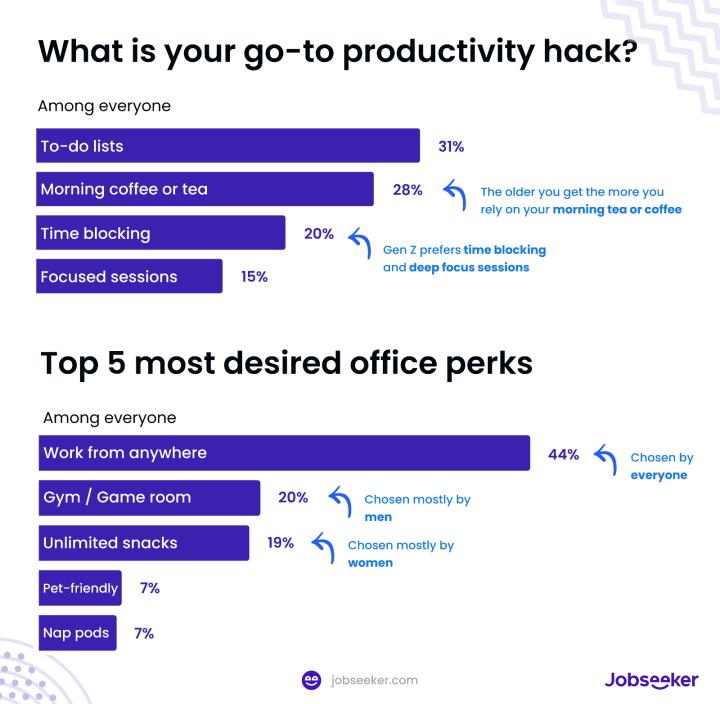 When it comes to office perks for 2025, US workers were in agreement that the ability to work from anywhere was the most desirable. A total of 44% of workers surveyed mentioned this as a key benefit. While an onsite gym or games room was next most popular for men (23%), unlimited snacks were more popular among women (21%) towards defining what a "good job" might be for them.
When it comes to office perks for 2025, US workers were in agreement that the ability to work from anywhere was the most desirable. A total of 44% of workers surveyed mentioned this as a key benefit. While an onsite gym or games room was next most popular for men (23%), unlimited snacks were more popular among women (21%) towards defining what a "good job" might be for them.
Key Takeaways for the 2025 Career Resolutions of US Workers
New Year's resolutions clearly play a key role in the career planning and progression of US workers. In an ever-competitive job market where changes of career are becoming more common, US employees are focused on skills development to help them get ahead of the competition. AI provides a potential solution to several challenges that could slow progress toward career goals. In an age where increasing job market and workplace competition, growing work-life balance pressures, and limited resources threaten to derail progress, AI gives workers hope that they can succeed with their career goals for 2025.
How to Achieve Career Goals in 2025?
Here are five effective, easy-to-implement strategies from Jobseeker career experts to support employees in upskilling and achieving their goals in 2025:
- Introduce time-blocking softwares: Give your employees access to productivity apps to help them manage their time and maintain focus on key tasks.
- Plan for personalized development: Work with employees to create tailored growth plans that align with their career aspirations and the organization’s goals, ensuring skill-building efforts are relevant.
- Establish quarterly career chats: Schedule brief, quarterly check-ins to discuss progress on career goals, provide feedback, and make adjustments as needed.
- Organize skill swaps: Organize informal skill-sharing sessions like “lunch and learns” or mini-workshops to encourage knowledge-sharing among team members.
- Create goal-setting templates: Provide structured templates that help employees set clear, achievable goals for the year, broken down into manageable quarterly milestones.
Sources:
1. Pew Research, Majority of U.S. Workers Changing Jobs Are Seeing Real Wage Gain
2. Coursera, The Fastest-Growing Job Skills of 2024 Report
Research and Analysis: Reyhane Mansouri
Written by: Mike Potter
Impress potential employers with your resume
Follow step-by-step professional guidance to create a polished resume in minutes.



